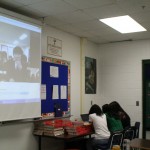Nearly seven-thousand miles away from the United States, South Korea has many perceived norms that aren’t quite accurate. Many Americans may believe that South Korean students don’t have a “social life” and have a stronger curriculum than American students are accustomed to. Although spending over ten hours in school for six days a week isn’t what one may perceive as enjoyable, South Korean students also find time to stay up hours past midnight to finish schoolwork.
Aside from being seven-thousand miles away from a highly social and media oriented America, South Korean students are far from “different” in comparison to American students.
Mr. Vaughn sponsors the Skype Club with the goal to create more understanding between cultures and break down the language barrier that stops people from respecting others outside of their country or society. Working with the National Consortium for Teaching about Asia department at Trinity University, Mr. Vaughn traveled to China, Japan, and South Korea in 2008 and 2009 to learn about East Asian culture and education.
Mr. Sage, the sponsor of Skype Club in South Korea, is the English Language teacher at the school. He hopes that the experience high school students get from this club will help break down the linguistic and cultural barrier that exists between people understanding others.
On Wednesday November 2, Skype Club had it’s first meeting of the year where they videochatted with Mr. Sage and his students.
“At first talking to the students is a little awkward. They speak English very well and liked talking with us. It’s really exciting getting to know them,” junior Victoria Goodwin said.
There aren’t many opportunities to get to know and understand people originating from different nations and cultures.
“It’s one thing to read about it, but it’s another thing to see it,” said Mr. Vaughn.” Getting to understand the commonalities and contrasts in Western and Eastern culture through the words we exchange with these students is definitely an eye opener.”

There are few things that South Korean students are able to do in their “free time”. San, a ninth-grader (junior in America) described her free time as,”Learning to drive, memorizing and practicing English, and watch movies. Otherwise, I have no free time. I go to school, go to after-academy, go home, do homework and sleep. It’s a cycle with no break.”
The after-academy is a supplementary after school institution that provides a private education for each student. San is majoring in education and plans to apply that in her career after she graduates.
Han, also ninth grade, appreciates her education believing it’s “good for when I enroll in the University.” The University is the greatest expectation that South Korean students hold themselves to. Han is majoring in art and design and plans to work at a local design agency after she graduates.
Without the letting the influence of media and pressures of social standards affect their studies, South Korean students find joy in attending school and getting along with each other. As a conversation starter, the students in South Korea and the members of Skype club both watched Mean Girls and wrote content related questions off of what they saw.
Seung, grade 11, asked, ” What does competition mean to you? Is it a good and useful way to be advanced among others? Or a heart-destroyed way for everyone?” Answering his question posed a clear distinction in how South Korean students compare to American students. Admitting that some members of Western society do compete within cliques to become more “advanced” is a cruel reality, however, Seung replied that “No one really is mean to each other here, we all tolerate each other and we’re all friends. Even if there were a problem, [it’s polite to not] express it or become competitive.”
Living with a highly regulated curriculum and rejecting the influence of media onto their lifestyles is “normal” for students in Korean society, yet American culture is the converse, dictating near impossible social standards and idolizing the influence of media.
Fortunately, the one thing Americans should know about South Koreans, it that their voice can be heard without using the same language. Differences that people perceive come from an origin of language barriers; when people perceive foreigners they have greater differences because they may not speak the same language or share the same culture.
“I have a story to tell, and knowledge to share,”said Mr. Sage. “To underestimate me because I do not speak the same language is hurtful. I give the same respect one would ask for, and I only ask for the same. Traveling the world has shown me that more people need to ‘walk in another’s shoes.’ I want Americans to know that we aren’t as different as many expect us to be.”








Mr Vaughn is so cool for doing this.